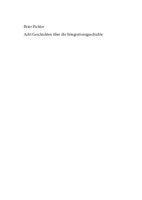Acht Geschichten über die Integrationsgeschichte
Zur Grundlegung der Geschichte der europäischen Integration als ein episodisches historiographisches Erzählen
Author(s)
Pichler, Peter
Collection
Austrian Science Fund (FWF)Language
GermanAbstract
European integration represents a historically unprecedented and new form of a continent's peaceful unification. Therefore, historiography needs innovative theoretical concepts to illustrate this process appropriately; at the present moment, however, integration history is only characterized by an extensive 'theoretical deficit'. The book project 'Acht Geschichten über die Integrationsgeschichte. Zur Grundlegung der Geschichte der europäischen Integration als ein episodisches historiographisches Erzählen' critically adopts this opinion and illuminates the theoretical principles of integration historiography. A proposal regarding the theoretical principles of unification historiography is compiled from an interdisciplinary perspective. The concept of the episodic historiographic narrative (Peter Pichler) understands the unification of Europe as a comprehensive cooperation and transformation process in which various historic strands (e.g. political, economic, cultural, social, legal, religious, etc.) interlink with each other. Therefore it would be most sensible to show their totality as an episodic historiographic network within the historiographic context. This theoretical proposal shall be provided for research as a new meta-perspective and methodical tool.
In a first step, the hitherto existing research on integration history is critically reviewed. Furthermore, its discourse will be analysed. Particular attention is paid to include Eastern and Southern European as well as Turkish perspectives. Their synopsis shows the interplay between the Eastern and Southern European 'transition'-narrative and the Turkish perspective on the integration process as the driving force of the debate. Furthermore, 'post-modern' perspectives on integration history represent an important feature of the discourse's acceleration and renewal. The first step ends with the contributors being able to give a first innovative impulse to the discursive renewal of research concerning integration history; the neoterised term 'transnarrative competence' allows for correlation between 'transition'-narrative and Turkish perspectives on integration.
In a second step, those theoretical features from recent developments in integration and historical theory are isolated that can contribute to a perspective renewal of research. The concept of the episodic historiographic narrative proposes an interdisciplinary theory based on those elements of political, social, legal and cultural sciences. The analytical narrative mindset of each element is determined and thus reconstructed as one episodic plot line, one episode of European integration history. The net of episodes eventually constitutes the proposed theory of an episodic historiographic narrative. Thus, the concept of the episodic historiographic narrative does not only enable histrorians to overcome the deficit in the theory of integration historiography but also enters new academic ground by uniting interdisciplinary elements to an episodic network. Die europäische Integration stellt eine historisch präzedenzlose und neuartige Form der friedlichen Vereinigung eines Kontinents dar. Die Geschichtswissenschaft benötigt daher innovative theoretische Konzepte, um diesen Prozess angemessen erklären zu können - zum gegenwärtigen Zeitpunkt ist die Integrationsgeschichte jedoch durch ein weitgehendes "Theoriedefizit" geprägt. Das Buchprojekt "Acht Geschichten über die Integrationsgeschichte. Zur Grundlegung der Geschichte der europäischen Integration als ein episodisches historiographisches Erzählen" nimmt diesen Befund kritisch auf und leuchtet die theoretischen Grundlagen der Integrationshistoriographie aus. In interdisziplinärer Perspektive wird ein Vorschlag zur theoretischen Grundlegung der Vereinigungshistoriographie erarbeitet. Das Konzept eines episodischen historiographischen Erzählens (Peter Pichler) begreift die Einigung Europas als einen umfassenden Kooperations- und Transformationsprozess. In diesem Prozess greifen verschiedenste geschichtliche Teilstränge (etwa politische, wirtschaftliche, kulturelle, soziale, rechtliche, religiöse usw.) netzwerkartig ineinander. Im historiographischen Text ist deren Gesamtes daher am sinnvollsten als ein episodisches historiographisches Netzwerk zu repräsentieren. Dieser Theorievorschlag soll als neue Metaperspektive und methodisches Arbeitsinstrument zu Verfügung gestellt werden.
Ein erster Arbeitsschritt unterzieht die bisherige Forschung zur Integrationsgeschichte einer kritischen Bestandsaufnahme und Diskursanalyse. Besonderes Augenmerk liegt darauf, auch ost- und südosteuropäische sowie türkische Perspektiven miteinzubeziehen. In der Synopsis zeigt sich das Zusammenspiel von ost- und südosteuropäischem "transition"-Narrativ sowie der türkischen Perspektive auf den Integrationsprozess als Motor der Debatte. Weiters stellen "postmoderne" Perspektiven auf die Integrationsgeschichte ein wichtiges Element der Beschleunigung und Erneuerung des Diskurses dar. Der erste Arbeitsschritt endet damit, einen ersten Innovationsimpuls zur diskursiven Erneuerung der integrationsgeschichtlichen Forschung geben zu können: Der neu eingeführte Begriff der "transnarrativen Kompetenz" ermöglicht es, "transition"-Narrativ und türkische Integrationsperspektiven aufeinander zu beziehen.
In einem zweiten Arbeitsschritt werden aus der jüngsten Entwicklung in Integrations- und Geschichtstheorie jene theoretischen Elemente isoliert, die zu einer perspektivischen Erneuerung der Forschung beitragen können. Das Konzept des episodischen historiographischen Erzählens verbindet diese Bausteine aus Politik-, Sozial-, Rechts- und Kulturwissenschaften zu einem interdisziplinären Theorievorschlag. Die Bausteine werden in ihrer jeweiligen analytischen Erzählhaltung bestimmt und somit als jeweils ein episodischer Erzählstrang, als eine Episode der Geschichte der europäischen Integration rekonstruiert. Das Netzwerk dieser Episoden macht schließlich den Theorievorschlag eines episodischen historiographischen Erzählens aus. Das Konzept des episodischen historiographischen Erzählens ermöglicht somit nicht nur die Überwindung des Theoriedefizits der Integrationsgeschichtsschreibung, sondern dringt mittels der Vereinigung interdisziplinärer Bausteine zu einem episodischen Netzwerk tief in wissenschaftliches Neuland vor.
Keywords
European integration; postmodernity; historical theory; cultural history; Diskurs; Europa; Europäische Integration; Europäische Union; Geschichtsschreibung; Kulturgeschichte; Theorie der GeschichteDOI
10.26530/oapen_437167OCN
995186567Publisher
Studien VerlagPublisher website
https://www.studienverlag.at/Publication date and place
Innsbruck, 2011Grantor
Classification
History


 Download
Download